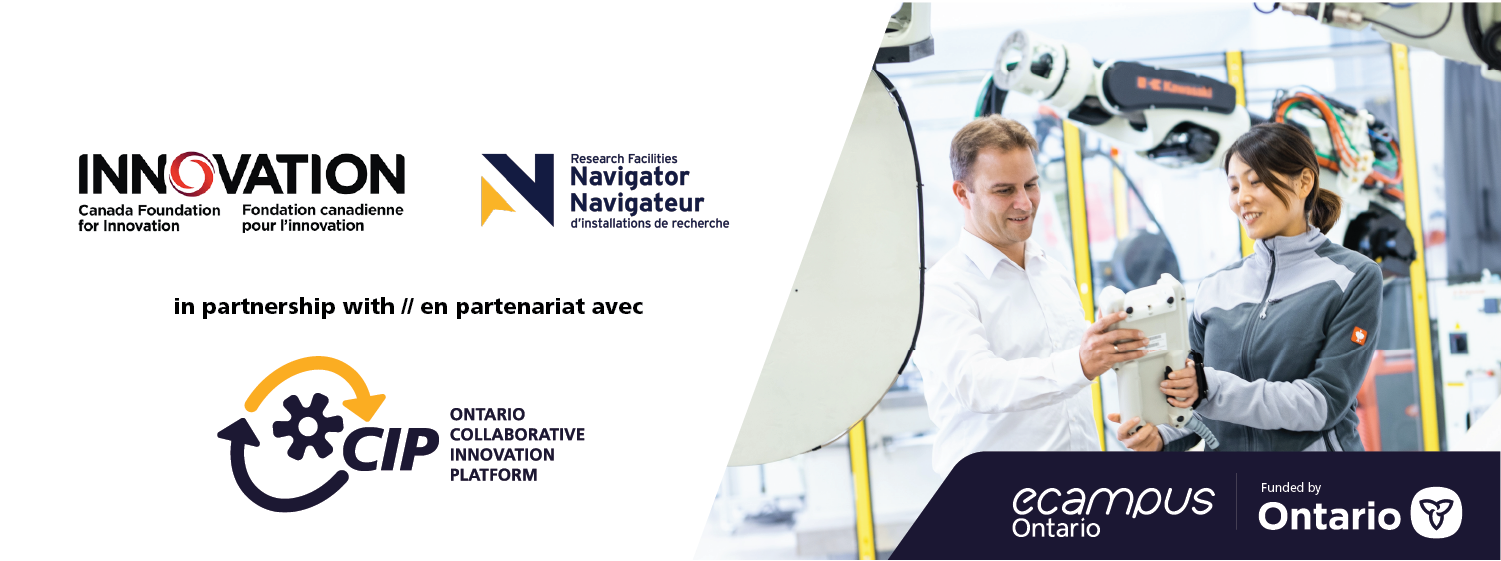
What does a micro-certification pilot really look like?
eCampusOntario’s work with micro-credentials aims to strengthen and expand micro-certification activity at Ontario colleges and universities through a common framework and a community of practice. As part of this work, eCampusOntario supports 14 education/industry micro-certification pilots, where Ontario post-secondary institutions and industry partners collaborate to test new credentials. Read a sample of pilot summaries below.
OCAD University and Myant Inc.: User-Centered Product Design
Myant Inc. is a leader in the computing textile industry and pioneer in the development of functionalized garments that positively impact health care diagnostics and interventions. In this technology-driven industry, there is a growing need for a labour force that has the ability to work collaboratively with both multi-disciplinary and diverse teams to develop an understanding of the problem to solve, and the skills to co-create solutions that are relevant and meaningful.
At the core of the User-Centered Product Design Pilot is the application of a human-centered design mindset. Through this project, we are working closely with our industry partner to develop curriculum that, in addition to addressing an immediate need in their industry, also contributes to building a more resilient and adaptable labour force.
“The opportunity to work with our industry partners through participating in pilot projects like this, goes a long way in expanding the pathways for our students to access and secure meaningful employment.”
— Robert Luke, Vice-President, Research + Innovation, OCAD University
“Having the ability to identify and access skilled labour in the area of user-centered product design directly supports the capabilities we require to design, engineer and manufacture both our and our clients’ products.”
— Milad Alizadeh-Meghrazi, Director of R&D Myant Inc.
Conestoga College and Workforce Planning Board of Grand Erie: connect2SKILLS
This unique micro-credential in the warehousing and logistics field is known as the connect2SKILLS program. This initiative was created at the conclusion of a 14-week sector study that identified severe labour shortages in the warehousing and logistics sector for Brant County. The study was comprised of industry, education, employment, training and workforce development stakeholders.
connect2SKILLS provides a way to align education, workforce development and support services to enable individuals who might perceive post-secondary education as out of reach to attain high-quality, sustainable employment. The program provides students with the essential operating requirements of a modern warehousing operations environment. This includes both technical skills and soft skills required to be successful in warehousing and logistics.
Conestoga College is proud to have partnered with the Workforce Planning Board of Grand Erie over the past two years to deliver the connect2Skills programming in Brantford ON. Participants attain increased technical literacy and basic understanding of supply chain management competencies as identified by a consortium of employers representing the sector. Seventy-five per cent of participants are successfully employed after graduation, which is one of the key highlights of this training.
Connect 2 Skills in the Media:
Tweet from Will Bouma, Parliamentary Assistant to Premier of Ontario, MPP Brantford-Brant:
“Hey #BrantfordBrant, great to be at the #Connect2Skills graduation ceremony tonight @ConestogaC Brantford! Congrats to all the Grads & thanks to @WorkforceGE for making it happen & being a part of our future!! #workingtogetherforyou”.
For more information about the Connect2Skills program, please see the following video to hear from employers and students about their experience in the program.
University of Windsor Continuing Education and Transform Shared Service Organization (TSSO): Health Informatics
As the digitization of records management in healthcare in the Windsor-Essex region is implemented over the next nine months, there will be a critical shortage of skilled informaticists in the area. This pilot project will produce a capable cohort of employable professionals to fill the gap.
The six modules in the health informatics pilot focus on the integration of key skills and competencies such as data analytics, project management, data security and systems classification in the healthcare setting. Learners undergo practical application by identifying, assessing and interpreting real-life healthcare scenarios in order to select and propose data-driven solutions.
“This project is the first of its kind for the University of Windsor where verifiable, meaningful micro-credentials will be issued in continuing education for advanced programming or ongoing skills updating.”
— Jennie Atkins, Executive Director, University of Windsor Continuing Education.
“TSSO looks forward to working with the University of Windsor in the continued development of the certificate in Health Informatics and add that we are interested in creating a pipeline of qualified applicants for anticipated employment opportunities within the health system in our region.”
— Lyn Baluyot, Chief Transformation Officer, Transform Shared Service Organization.
Sault College and Project Learning Tree Canada: Aboriginal and Treaty Rights
There is a pressing need for practical, high-quality learning opportunities around Indigenous rights and relationship-building within Ontario’s forest sector, as well as across Canada. More specifically, there is a need to offer online learning opportunities since it may be difficult for individuals in the forest sector to attend traditional in-class training due to operating in diverse and remote locations across Canada.
The targeted competency for this e-learning course is an understanding of Aboriginal and Treaty rights within the context of the forest sector in Canada. It will draw on case and constitutional law and will consist of information that would be of universal relevance to both current and future forestry practitioners across Canada.
Rachel Hill, E-Learning Program Manager at Sault College had the following to say about this unique partnership and learning opportunity: “Sault College proudly celebrates the languages, cultures and traditions of Indigenous peoples. We also offer an amazing Natural Environment and Outdoor Studies programs with many of our graduates working in the natural resource sector. To complement this, we are pleased to work with Project Learning Tree Canada to develop a unique online course that will provide forestry practitioners with an understanding of their responsibilities associated with upholding Indigenous peoples’ rights. It will also provide information to help build and maintain relationships with Indigenous communities, who play a key role in the management of Ontario’s forests.”
Paul Robitaille, Manager, Indigenous and Youth Relations at Project Learning Tree Canada (PLT Canada) had the following to say: “PLT Canada, an initiative of the Sustainable Forestry Initiative, takes special pride in our organizations’ commitments to supporting our diverse national network, including Indigenous Nations and forest sector organizations. We are interested in co-developing local forest-focused solutions that address communities’ and nations’ current needs while also providing the tools they need to pursue and achieve their diverse aspirations long into the future. This exciting project with Sault College is just one more way that we hope to help grow meaningful forest-focused relationships between Indigenous Peoples and organizations of all kinds right across Canada.”
Wilfrid Laurier University and Brantford Police Service: Understanding and Fostering Relationships in Human Trafficking Cases
Human Trafficking is a complex crime that can often go undetected and underreported due in part to the vulnerability of the victims, distrust of authorities, or fear of prosecution for illegal acts victims were forced to perform by their traffickers.
This micro-certification will provide Brantford Police Service officers and civilian staff with specific training to build skills, competencies, knowledge and support to enhance relations between police and victims as well as build trust to hopefully have greater success in identifying and assisting victims.
“We look forward to furthering our partnership with Brantford Police Service and working together to address this important and growing issue.” — Holly Cox, Manager, Centre for Public Safety and Well-Being
“Due to the complexity of these types of calls, the vulnerability of the people involved and the reluctance of victims to come forward, the police have recognized a need to be more proactive in their approach to addressing the needs of the individuals affected.”
— Jason Saunders, Deputy Chief, Brantford Police Service.
George Brown College, Deafblind Community Services, The Canadian Helen Keller Centre (CHKC) and Deaf Blind Ontario Services: Deafblind Intervening
Deafblind intervening is a critical skill set that enables effective communication between individuals who are deaf and blind, and others within society. Intervenors need to upgrade their medical communication skills and vocabulary to communicate and translate effectively to support clients who are accessing or interested in obtaining these new treatments.
Upgrading communication skills is a key identified area of focus by George Brown College, the Canadian National Institute for the Blind, The Canadian Helen Keller Centre, and the Deaf-Blind Ontario Services. We are proposing that the micro-certification program for deafblind intervening evaluate proficiency and accuracy in medical communication skills, piloting with American Sign Language.
“This project will benefit students because it will give them labour market ready skills within flexible learning environments. The project will help bring clarity to a new credential and provide insight into the variety of ways other institutions are providing students with labour market skills.”
— Juanita Wattam, Director of Academic Quality at George Brown College
“As an employer of graduates from the Intervenor Program, we are currently seeing an increased need to develop more specific or targeted skills for our front-line workers in the areas of communication, aging and mental health for individuals who are deafblind. A micro certification program would be beneficial in helping students and Intervenors already working in the field develop these much-needed skills, and therefore CHKC supports George Brown College’s participation in this pilot program.”
— Jennifer Robbins, Executive Director, CHKC
University of Waterloo and Electricity Human Resources Canada (EHRC): Communication and Teamwork
This pilot is addressing teamwork and communication skills. EHRC has recently identified communication and teamwork as two of the electricity sector’s most pressing skill needs.
Students participating in the pilot must achieve a grade of 80% or higher in a professional development (PD) course, as well as a rating of “superior” performance in relevant categories on a co-op student performance evaluation. This means that a digital micro-credential is only issued when the university (through the PD course) and the employer (through the evaluation) have verified the student’s excellence in their chosen competency.
“We’re so pleased to partner with EHRC on this pilot project,” says Anne-Marie Fannon, director of the Waterloo Professional Development Program at the University of Waterloo. “EHRC is a strong proponent of work-integrated learning (WIL) in Canada. They are a natural partner for exploring the role of digital micro-credentials in assessing and validating competencies in a WIL context, and more specifically within the electricity sector.”
Michelle Branigan, CEO of EHRC, is encouraged by this project. “EHRC hears all the time from industry employers about the importance of developing professional skills in students before they enter the workforce. As a leader in both technical and professional education, partnering with the University of Waterloo on this micro-credentialing pilot project was a natural fit.”


